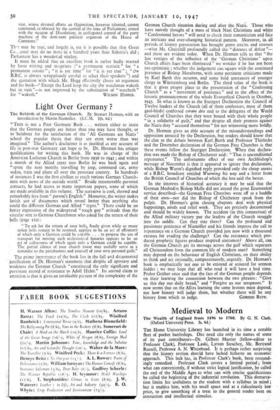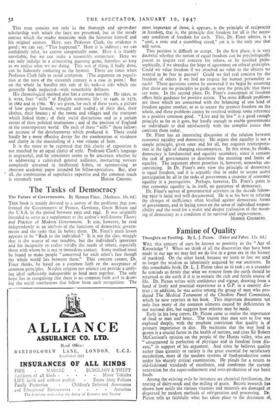Medieval to Modern
The Wealth of England from 1496 to 1760. By G. N. Clark. (Oxford University Press. 3s. 6d.)
THE Home University Library has launched in its time a notable fleet of pocket battleships. One need cite only the names of some of its past contributors—Dr. Gilbert Murray (fellow-editor to Professor Clark), Professor Laski, Lytton Strachey, Mr. Bertrand Russell, Professor A. N. Whitehead. It is perhaps rather surprising that the history section shoold have lacked hitherto an economic approach. This lack has, in Professor Clark's book, been resound- ingly remedied. Professor Clark covers a limited period ; from what can conveniently, if without strict logical justification, be called the end of the Middle Ages to what can with similar qualifications be called the beginning of the industrial revolution. This demarca- tion limits his usefulness to the student with a syllabus in mind; but it enables him, with his small space and at a ridiculously low price, to give something of a treat to the general reader bent on instruction and intellectual stimulus.
This treat consists not only in the thorough and up-to-date scholarship with which the facts are presented, but in the steady contact which the reader maintains with the historian himself and his original sources. Here, says Professor Clark, the evidence is good ; we can say, "This happened." Here it is indirect ; we can confidently infer, we cannot categorically state. Here it is frankly unreliable, but we can make a reasonable conjecture. Here we can only indulge in a stimulating guessing game, harmless so long as we realise what we are doing. This sort of thing, if badly done, can be hideously confusing to the layman. There are times when Professor Clark fails to avoid confusion. (The argument on popula- tion at the turn of the sixteenth century is a case in point.) But on the whole he handles this side of his task—a side which one generally finds neglected—with remarkable deftness.
His chronological method also hat a certain novelty. He takes, as it were, four " stills " of English economic life ; in 1496, in 1572, in 1662 and in 1760. We are given, for each of these years, a picture of how people farmed, wrought and traded ; of their diet, their clothes, their houses ; of the towns and villages and the transport which linked them ; of their social distinctions and to a certain extent of their political institutions ; and of the position of England in the contemporary world. On each of these " stills " there follows an account of the developments which produced it. There could hardly be a more effective device for the combination of vividness and clarity in the marshalling of a vast volume of facts.
It is the more to be regretted that this clarity of exposition is not matched by an equal clarity of style. Professor Clark's language is ungraceful, and he sometimes seems to be uncertain whether he is addressing a cultivated general audience, instructing novices completely unversed in intellectual habits, or summarising an abstruse academic paper intended for fellow-specialists. But, after all, the combination of superlative expertise and the common touch



































 Previous page
Previous page